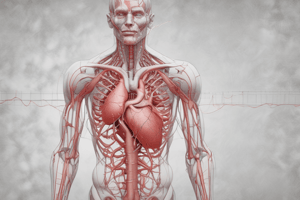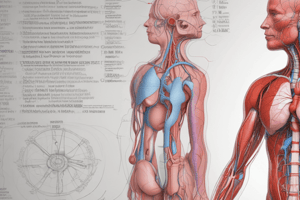Podcast
Questions and Answers
What is the main function of Neutrophils in the body?
What is the main function of Neutrophils in the body?
- Release chemicals that trigger inflammation
- Kill viruses
- Phagocytosis and fighting bacterial infections (correct)
- Produce antibodies
What is the term for the thickening or hardening of the arteries?
What is the term for the thickening or hardening of the arteries?
- Atherosclerosis (correct)
- Cardiac tissue
- Angina pectoris
- Myocardial infarction
What is the name of the sac that surrounds the heart?
What is the name of the sac that surrounds the heart?
- Myocardium
- Pericardium (correct)
- Septum
- Atrioventricular valves
What is the main function of the cardiovascular system?
What is the main function of the cardiovascular system?
What is the term for the circulation of blood from the heart to the lungs and back again?
What is the term for the circulation of blood from the heart to the lungs and back again?
What is the main function of Basophiles in the body?
What is the main function of Basophiles in the body?
What is the pathway of blood in the body?
What is the pathway of blood in the body?
What is the term for a part of the heart dying due to lack of oxygen?
What is the term for a part of the heart dying due to lack of oxygen?
What is the function of arterioles?
What is the function of arterioles?
What is the function of venules?
What is the function of venules?
What is the function of capillaries?
What is the function of capillaries?
What is the function of erythrocytes (RBCs)?
What is the function of erythrocytes (RBCs)?
What is the layer of cells that makes up the walls of capillaries?
What is the layer of cells that makes up the walls of capillaries?
What is the purpose of valves in veins?
What is the purpose of valves in veins?
Flashcards are hidden until you start studying
Study Notes
Cardiovascular System
- The cardiovascular system includes the heart and blood vessels, bringing nutrients to cells and removing wastes.
- Blood is refreshed in the lungs, kidneys, intestine, and liver, with lymphatic vessels collecting excess fluid and returning it to the cardiovascular system.
Heart and Blood Vessels
- The heart is a large, muscular organ consisting of mostly cardiac tissue (myocardium) surrounded by a sac (pericardium).
- It has two sides (right and left) separated by a septum, with four chambers: two atria and two ventricles.
- The heart has two sets of valves: semilunar valves and atrioventricular valves (AV valves), which produce the "lub" and "dup" sounds when closing and opening.
Blood Vessels
- Arteries carry oxygenated blood away from the heart (except pulmonary artery), with three layers: endothelium, smooth muscle, and outer connective tissue.
- Arterioles are smaller blood vessels that branch off from arteries.
- Veins carry deoxygenated blood toward the heart (except pulmonary vein), with three layers: epithelium, smooth muscle, and outer connective tissue.
- Venules are smaller blood vessels that branch off from veins.
- Veins that carry blood against gravity have valves to keep blood flowing toward the heart.
Capillaries
- Capillaries are microscopic vessels between arterioles and venules, made of one layer of epithelial tissue (endothelium).
- They form beds of vessels where exchange with body cells occurs, with a large surface area surrounding different tissues.
Blood Composition
- Erythrocytes (RBC) contain hemoglobin, an iron-containing protein that transports oxygen.
- Leukocytes (WBC) include:
- Neutrophils: phagocytosis, bacterial infection
- Lymphocytes: kill viruses, antibody production
- Eosinophils: allergy, kill parasites
- Monocytes: phagocytic function
- Basophils: release chemicals that trigger inflammation
- All blood cells develop from a common source of stem cells in the red bone marrow.
Cardiovascular Pathways
- Pulmonary circulation: a short loop from the heart to the lungs and back again.
- Systemic circulation: carries blood from the heart to all other parts of the body and back again.
Cardiovascular Diseases
- Atherosclerosis: thickening or hardening of the arteries due to a buildup of plaque (fatty substances, cholesterol, cellular waste products, calcium, and fibrin).
- Heart attack (myocardial infarction): part of the heart dies due to lack of oxygen, often beginning with angina pectoris (pain radiating down the left arm due to a blockage of a coronary artery).
Studying That Suits You
Use AI to generate personalized quizzes and flashcards to suit your learning preferences.




